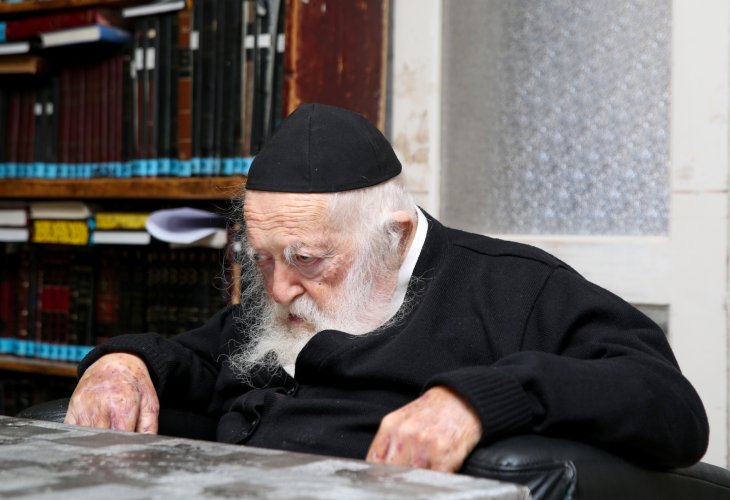Jewish Law
Honoring Parents in Torah Law: A Mitzvah that Impacts Generations
Why did Rabbi Chaim Kanievsky call honoring parents 'a matter of life and death'?
 (Photo: David Cohen / Flash 90)
(Photo: David Cohen / Flash 90)What does it truly mean to honor your parents according to Torah law? Rabbi Chaim Kanievsky, one of the most revered Torah scholars of this generation, didn’t just teach this mitzvah — he lived it with extraordinary sensitivity. His personal conduct, and the stories his children share, offer a rare window into the halachic ideal of kibbud av va’eim — honoring one's father and mother — as a daily spiritual practice.
A Father's Quiet Example
Rabbi Chaim Kanievsky, often called “the Prince of Torah” due to his unparalleled breadth of Torah knowledge, was deeply devoted to the mitzvah of honoring one's parents. But as his son, Rabbi Yitzchak Shaul, shared in an interview, that devotion wasn’t something he demanded of his children — it was something he modeled himself.
“Father never asked us to show him respect and he never commented when we fell short,” Rabbi Yitzchak Shaul relates. “But when it came to Mother, he insisted we accord her great honor.”
For example, Rabbi Chaim wouldn’t allow his children to begin eating until their mother had started her meal. “He never said a word if we began before him, but with Mother, he was very particular that we show respect,” his son recalls.
Never Saying "Seven O'Clock"
This reverence extended to the smallest details. Rebbetzin Batsheva Kanievsky, Rabbi Chaim’s wife, was the daughter of Rabbi Yosef Shalom Elyashiv, one of the leading halachic authorities of the 20th century. Rabbi Elyashiv affectionately called his daughter “Sheva,” a shortened form of her name.
Because of this, Rabbi Chaim would not let his children say the word “seven” (sheva in Hebrew), even when telling the time. Referring to or calling one's parents with their first name is forbidden by Torah law, as it shows a lack of respect. But Rabbi Chaim went further:
“Father didn’t allow us to say ‘seven o’clock,’ because that was Mother’s name,” says Rabbi Yitzchak Shaul. “To this day, it’s ingrained in us — we avoid saying that hour."
Honoring the Previous Generation
Rabbi Chaim extended the same consideration to his own parents. To this day, he avoids using the name “Yaakov Yisrael,” which was his father’s name (the Steipler Gaon, a towering Torah sage of the post-war generation). Instead, he uses alternative forms of address out of reverence.
His own name — Shmaryahu Yosef Chaim — also reflects this sensitivity. The first two names, Shmaryahu Yosef, were in honor of his maternal grandfather, the father-in-law of both the Steipler and the Chazon Ish. The third name, Chaim, was added at the last moment.
On the way to the brit milah (circumcision), the Steipler suddenly thought, “Who knows if I will merit to have another son?” and decided to also name the baby after his own father. When he shared this with his wife, the Rebbetzin responded with obvious relief: “I'm so glad! I’ve been feeling uneasy about calling him Shmaryahu Yosef, as those were my father’s names. I’m so happy you added another name.”
She called him “Chaim” from that moment on — and the name stuck.
Rabbi Yitzchak Shaul reflects: “Many people get offended if you don’t name a child after their parents. But here, it was the opposite — my mother was relieved she wouldn’t have to utter her father’s names. That kind of awe and sensitivity is almost unheard of today.”
A Mitzvah That Shapes Generations
Rabbi Chaim Kanievsky often quoted his father, the Steipler Gaon: “As a son behaves toward his father, so will his children behave toward him.” For Rabbi Chaim, honoring one’s parents wasn’t only a mitzvah — it was an investment in one's future generations.
Boys preparing for their bar mitzvah would often ask Rabbi Chaim which mitzvah they should focus on. He would typically answer one of two responses: “Complete the Shas” (the entire Talmud), or “Enhance your observance of the mitzvah of kibbud av va'eim.”
When asked why, Rabbi Chaim cited the Jerusalem Talmud (Kiddushin 22b): “Rabbi Yossi said: What is the one mitzvah the Mishnah refers to when it says ‘One who fulfills a mitzvah will benefit’? Honoring one's father and mother.”
Why This Mitzvah Matters So Much
What makes this mitzvah so unique? Rabbi Chaim explained in his father’s name that kibbud av va’eim is one of the few commandments that can be fulfilled constantly — unlike most mitzvot that are time-bound or situational.
He was once asked: “If someone has the opportunity to honor both his father and a kohen (priest), who comes first?” Rabbi Chaim replied without hesitation: “His father.”
The questioner persisted: “But even his father is required to honor a kohen!”
Rabbi Chaim responded: “Honoring one's father is pikuach nefesh (a matter of life and death), because the Torah says [that one of the reasons why we observe this mitzvah is] ‘So that your days may be lengthened’ — and the verse is to be taken literally.”
In Rabbi Chaim’s eyes, honoring one’s parents wasn’t merely a beautiful ideal. It was a spiritual lifeline — a mitzvah with tangible consequences in both this world and the next.
The Heart of the Mitzvah
So what is the essence of kibbud av va’eim?
It’s not just about checking off obligations. It’s about cultivating reverence and gratitude, about coming to see our parents as the source of our life.
As Rabbi Chaim Kanievsky taught through his actions and his words, honoring our parents isn’t just something we do — it’s something we become.

